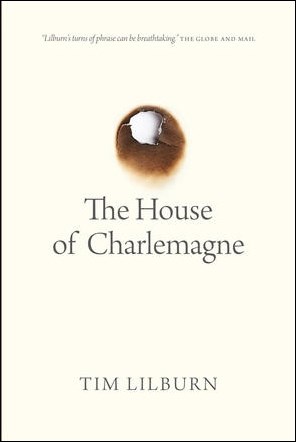By Tim Lilburn
Published by University of Regina Press
$19.95 ISBN 978-0-88977-530-5
Years ago I lived a block from poet and essayist Tim Lilburn in Saskatoon’s leafy City Park area, and it’s been wonderful to watch his literary star rise. He has earned the Governor General’s Award for Poetry, and is the first Canadian to win the European Medal of Poetry and Art. Like Lilburn, I also now live on Vancouver Island, and was excited to discover what my former nearly neighbour has been up to.
Not surprisingly, his latest title – a collaboration with Métis artist Ed Poitras — breaks new ground. Part poetry, part essay, part script, The House of Charlemagne is a brilliantly conceived and executed “performable poem,” and an homage to Louis Riel’s imagined “House of Charlemagne,” named for the “polyglot Métis nation” Riel imagined rising centuries after his death. It was produced with male and female dancers by New Dance Horizons/Rouge-gorge in Regina (2015), and the book includes two black and white production photos.
The bizarre and poetic story unfolds via multiple voices and shapes, but the key player is Honoré Jaxon (aka William Henry Jackson), a University of Toronto educated non-Métis and son of a Prince Albert shopkeeper. Jackson became Riel’s final secretary, embracing the leader’s metaphysical beliefs about “active essences.” He was sentenced to an insane asylum, and died old and living in a “small fort” made of empty ammunition boxes in New York, where he’d attempted to gather published material that celebrated the Métis. Lilburn takes these “bones” and, like an orthopedic surgeon, constructs a body that is political, intellectual and philosophical, and it howls.
The book’s first part, Massinahican (Riel’s text that “attempt[ed] to render old Rupert’s Land .... into philosophy, interiority and politics”) is an amalgam of history; quotations (in French) from Riel’s work and from others — Julian of Norwich and Plato; free verse poetry; and a description of the dance production.
During the multi-art performance, Lilburn sat side-stage and symbolically “sent large sections of the poem skittering into the movement” while live music (by Jeff Bird of the Cowboy Junkies) and geese, wind, gunshot and water special effects were played.
The second part is the three-act poetic performance script, including dialogue between Riel and Jaxson. The former says to the latter: “You and I are badger-mind/wasp-intuition.” In the prison scene, a guard says: “You were Platonic fools we dismembered/to save you from the embarrassment your sky thought/would inevitably have brought you.” In Act 3, when Jaxson maligns the fact he’s failed to gather the archives of “the Last Provisional Government at Batoche,” he says of the blowing papers: “How strange this is the result/of such thousand horse-powered longing”.
Evidenced in the poetry is Lilburn’s intrinsic sense of the natural world, an ear tuned to the song of the land and multiple mentions of communities (Last Mountain Lake, Souris, Riding Mountain). Scents are featured, too — “The damp, cool/blue smell of the Crowsnest Pass.”
Lilburn’s latest looks at history through a different lens, and makes a sound like “the engine room of God’s warm breath.”
— This book is available at your local bookstore or from www.skbooks.com




